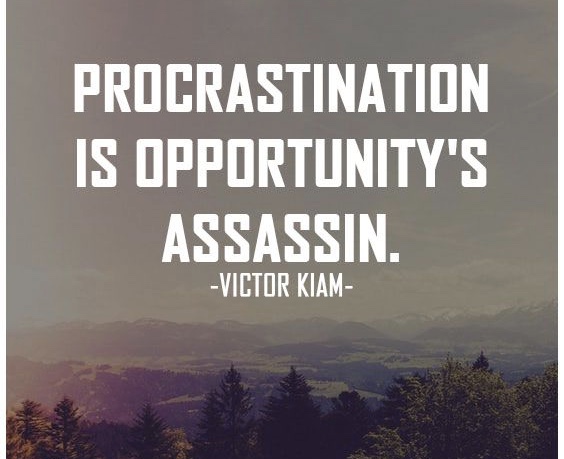Between 25 and 75% of college students report procrastinating, and it’s not a habit that goes away with maturity. Around 20% of adults are chronic procrastinators, says psychology professor and author Joseph Ferrari.
Some say procrastination is just laziness, but chronic procrastinators know the truth. When you procrastinate, you end up working harder because you let things stack up and must plow through in epic work sessions. You’re also more likely to work rushed and stressed, which can lead to increased error rates, burn out, and discontentment with your work or life in general.
If you’ve ever procrastinated to serious levels, you probably recognize this truth. You might have promised yourself “never again.” Yet a day or week later, you’re back in the same situation.
Here are five tactics that help you turn that promise into reality by facing down procrastination long-term.
Choose and prioritize projects and tasks.
Your executive brain function makes it possible to make decisions, plan ahead, focus on tasks, and remember instructions. Like any part of your mind or body, that function doesn’t have infinite energy.
If you’re making decisions or task-switching constantly throughout the day, you can wear your executive function out, leaving you without the motivation or energy to complete work. That can lead to procrastination.
Prioritizing and planning ahead of time can reduce this phenomenon, which is called decision fatigue. Planning also helps you choose tasks realistically. You only have 24 hours each day, and shoving 30 hours of stuff into each burns you out quickly, making procrastination more likely.
Takeaway step: Brainstorm a list of everything you want to do. Prioritize tasks by importance to you, your employer, deadlines, and whether other tasks rely on you completing certain items first. Choose three tasks as your main priority each day. You can’t accomplish everything in one day, but you’re more likely to go ahead and get things done when your to-do list is realistic.
Find your power hours and do your work then.
You can’t always clock out when you’re tired, but you can manage task loads in a way that flows with personal energy levels. While research has shown people perform certain tasks better at certain times each day, every person is unique. Work to discover when you’re most efficient and energized and schedule tasks then.
Takeaway step: Keep notes in a planner or notebook for a week or two. Track when you complete tasks efficiently, feel most energized and able to conquer work, and falter most. Look for patterns to find your power hours for certain types of tasks.
Align your inputs with consistently productive output.
Your body is a machine, which means everything you put in it impacts the output. Negative thoughts and behaviors can feed procrastination and other bad habits and reduce productivity. But so can a poor diet or lack of an exercise program.
Takeaway step: Replace sugary snacks and caffeinated beverages with energy-rich foods such as nuts, seeds, fruits, and veggies. Ween yourself off all-day coffee and soda in favor of herbal teas believed to boost focus, such as ginseng tea. Remember to discuss dietary concerns and exercise needs with your healthcare provider if you’re making major changes or have a chronic condition to manage.
Partner with someone for real accountability.
Getting to the end of the day and admitting to yourself you didn’t accomplish what you set out to do can be demoralizing. But we often excel at making excuses to ourselves. It’s much harder to BS your way out of something when you report to someone else.
Takeaway step: Partner with a friend or coworker you trust for accountability. Let each other know your plans and goals for the day or week. Check in at lunch or on Wednesday for moral support and again at the end of the day or week to report on what went right and wrong and to get the other person’s feedback to help stave off procrastination.
Dig deeper to the root cause of your procrastination.
What if procrastination was the symptom and not the problem? It happens, which is why many people struggle to overcome procrastination: They’re not working on the right issue. Anxiety, stress, health or emotional issues, or a problem somewhere else in life can all cause procrastination. Getting to the root cause helps you work on the right problem, which can lead to less procrastination naturally.
Takeaway step: Get out a notebook or talk to a trusted loved one. Start writing down or talking about all the reasons you might be procrastinating, going as deep as possible. Look at the list and see which of those items you can work on. If this step is extremely hard or you find you can’t face some of these issues alone, consider reaching out for counseling or other help addressing health concerns or negative thoughts, behaviors, or challenges.
Ultimately, the only person who can beat your procrastination is you. But it’s not a simple battle of wills between you and an imaginary opponent. It’s a strategic fight you have to prepare for; use the tips above to arm up for greater success in facing down procrastination.


